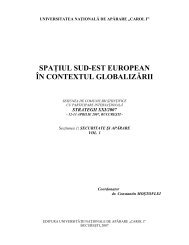PROVOCĂRI LA ADRESA SECURITĂŢII ŞI STRATEGIEI LA ÎNCEPUTUL SECOLULUI XXI
provocări la adresa securităţii şi strategiei la începutul secolului xxi
provocări la adresa securităţii şi strategiei la începutul secolului xxi
Create successful ePaper yourself
Turn your PDF publications into a flip-book with our unique Google optimized e-Paper software.
including aspects such as consumer protection, standards, environmental<br />
and research bodies, could be opened to all neighbouring countries.<br />
For Russia and the WNIS, Free Trade Areas are envisaged in the<br />
PCAs, but with no timetable attached. Objectives and benchmarks could be<br />
developed. The sequencing of economic rapprochement is important to<br />
ensure that liberalisation really helps development. For Moldova which does<br />
not currently possess the competitive strength or administrative capacity to<br />
take on the reciprocal obligations of an FTA yet, the EU is ready to consider<br />
developing new initiatives to grant better market access, in line with WTO<br />
obligations.<br />
Russia is the eastern neighbour with which the Union has the<br />
longest border.<br />
With enlargement, this border will rise from 1300 to more than<br />
2200 kilometres. In addition to Finland, four new Member States are your<br />
direct neighbours. The Kaliningrad oblast of the Russian Federation will<br />
find itself surrounded by the EU.<br />
Russia answers for around 40% of the population and the GDP of<br />
the countries covered by the Wider Europe initiative. Its weight on eastern<br />
border OF Union is of course preponderant. With enlargement, the EU share<br />
in Russia’s foreign trade will increase from around 35% to 50%.<br />
The Russian Federation is of course much more than a neighbour<br />
to the Union.<br />
Its geography, its size and potential, and its role in world affairs<br />
make that the relationship with Russia has developed into a far-going<br />
strategic partnership.<br />
The European Union and Russia have been working together on<br />
numerous international issues. A broad co-operative approach, in full<br />
respect of the two parties’ interests, positions and independence of action,<br />
has replaced reflexes of the past. The importance of this relationship has<br />
been repeatedly highlighted in the context of the difficult international<br />
problems and challenges we have been facing in recent years.<br />
Russia will benefit from the European Union’s enlargement:<br />
_ As in the case of other partners, Russia will benefit from the<br />
extension of the area of stability and prosperity in the European continent, as<br />
it is in our vital interest to be an open and reliable partner<br />
_ It will benefit from the opportunities created through the<br />
enlargement of our Internal Market.<br />
_ It will benefit from a European Union that will become stronger<br />
and more active on the international scene.<br />
From the EU perspective, the most important neighbour’s place in<br />
our neighbourhood policy is self-evident, for reasons of coherence and<br />
inclusiveness. EU and Russia have common borders, while many<br />
neighbourhood issues have a regional dimension where Russian<br />
involvement is important; indeed, it is the absence of Russia from such a<br />
framework that would seem odd.<br />
In the relations EU with Russia, there is a large range of issues<br />
which would be relevant to address through the Wider Europe policy, or<br />
having this policy in mind: cross border co-operation, border management,<br />
transport and energy corridors, Black Sea pollution, fight against drug<br />
trafficking and other forms of organised crime are just a few examples. Of<br />
course, EU and Russia should take full account of existing policies and<br />
frameworks: for instance, the internal market related parts of a possible<br />
Action Plan with Russia would have to reflect the Common European<br />
Economic Space concept.<br />
Regions on both sides of EU and Russia common frontier will<br />
benefit from the planned New Neighbourhood Instrument, which is an<br />
important element of the Wider Europe approach.<br />
The EU and Russia should also explore how regional initiatives<br />
such as the Northern Dimension, the Baltic Council, or the Organisation for<br />
Black Sea Economic Co-operation could best be served by the Wider<br />
Europe initiative and its instruments.<br />
An Action Plan with specific targets and timelines, setting out the<br />
reciprocal undertakings of both sides that would be agreed between the two<br />
parties along the lines foreseen in the Wider Europe initiative would be a<br />
useful instrument in moving forward our vision of the Common spaces.<br />
For all these reasons, the Wider Union – New Neighbourhood<br />
initiative provides substantial added value to our relationship with Russia<br />
[12].<br />
_ First, there is of course no question of downgrading of<br />
abandoning our strategic partnership. This will stay and develop as we both<br />
want. The idea of EU is to integrate the Wider Europe - New<br />
Neighbourhood concept into the broader relationship EU-Russia and not the<br />
other way round.<br />
_ Second, EU do not intend to abandon or duplicate the rich<br />
bilateral framework for eu-Russia relations, a framework which covers all<br />
possible areas. All the less so since its potential has not been fully exploited.<br />
At a later stage, EU could envisage upgrading the contractual framework,<br />
but EU and Russia should first see that the present one is fully used.<br />
_ Third, the principle of differentiation is a key notion of EU<br />
neighbourhood policy, fully guarantees that no special relationship will be<br />
harmed, and no country will find its way barred by others.<br />
309<br />
310



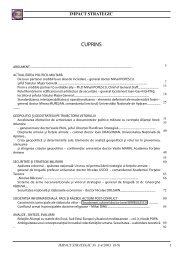

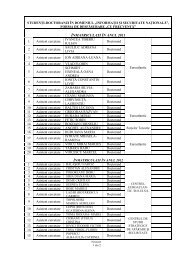
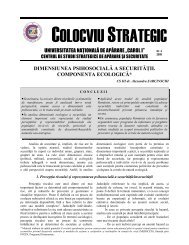
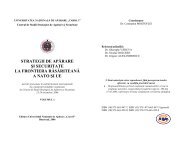
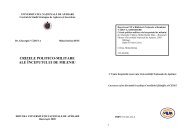
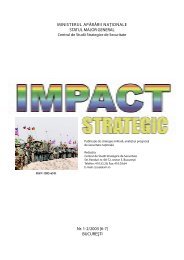


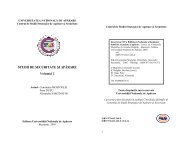
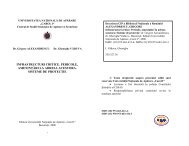
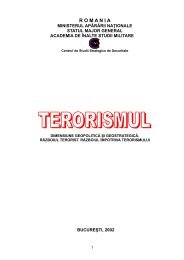
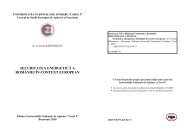
![„CAROL Nr 4 [29]/2008](https://img.yumpu.com/53801719/1/184x260/carol-nr-4-29-2008.jpg?quality=85)
